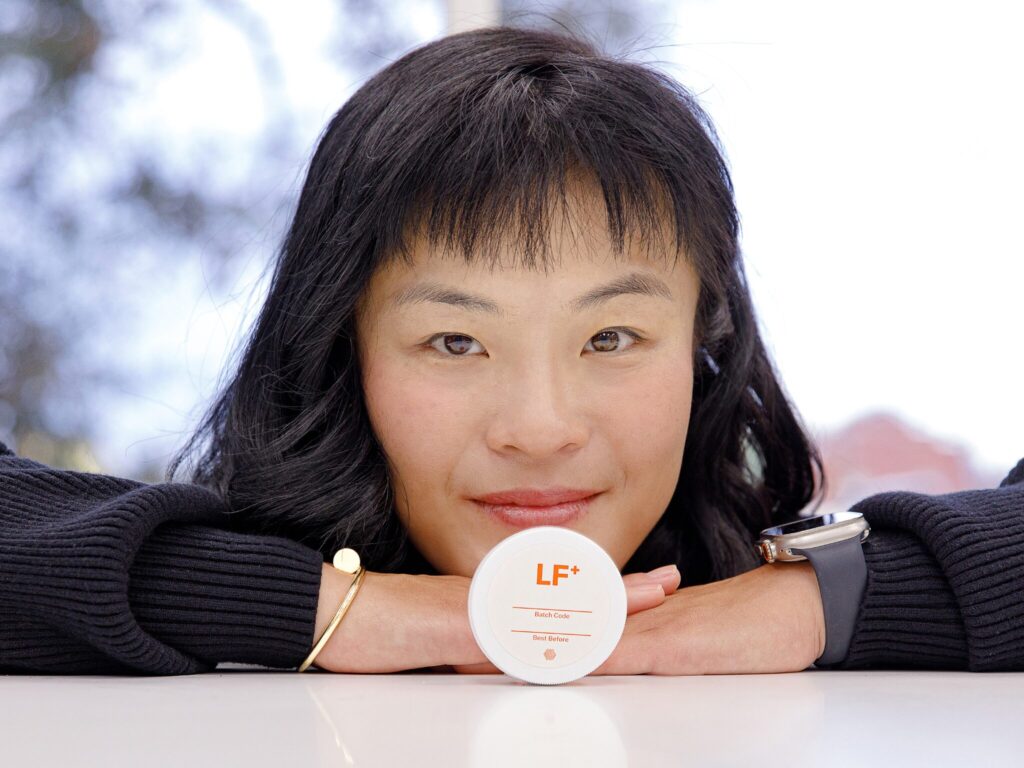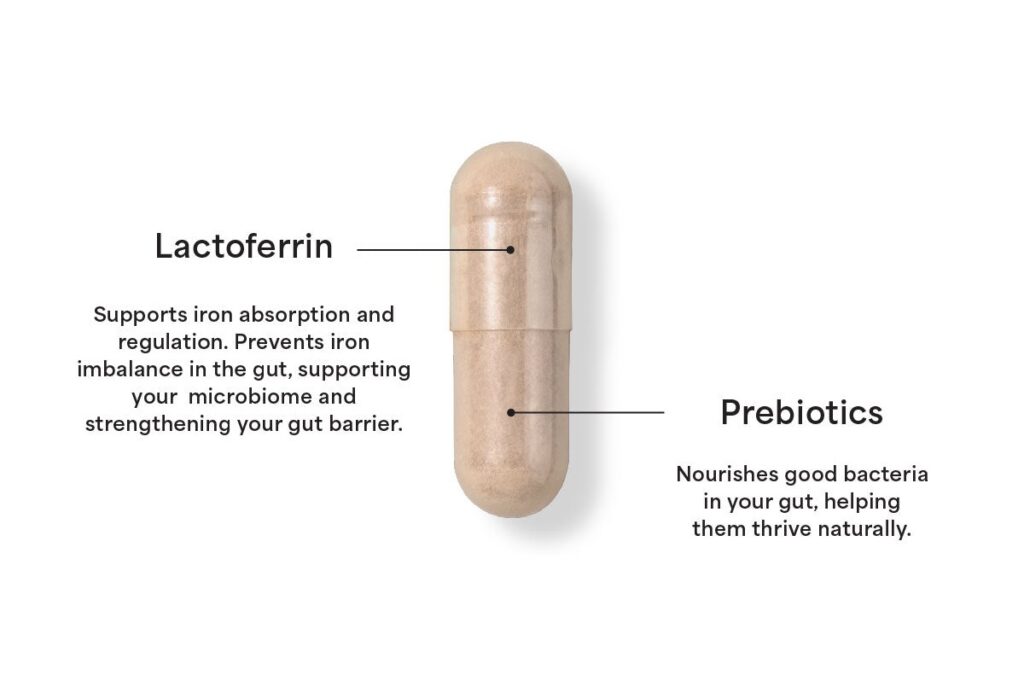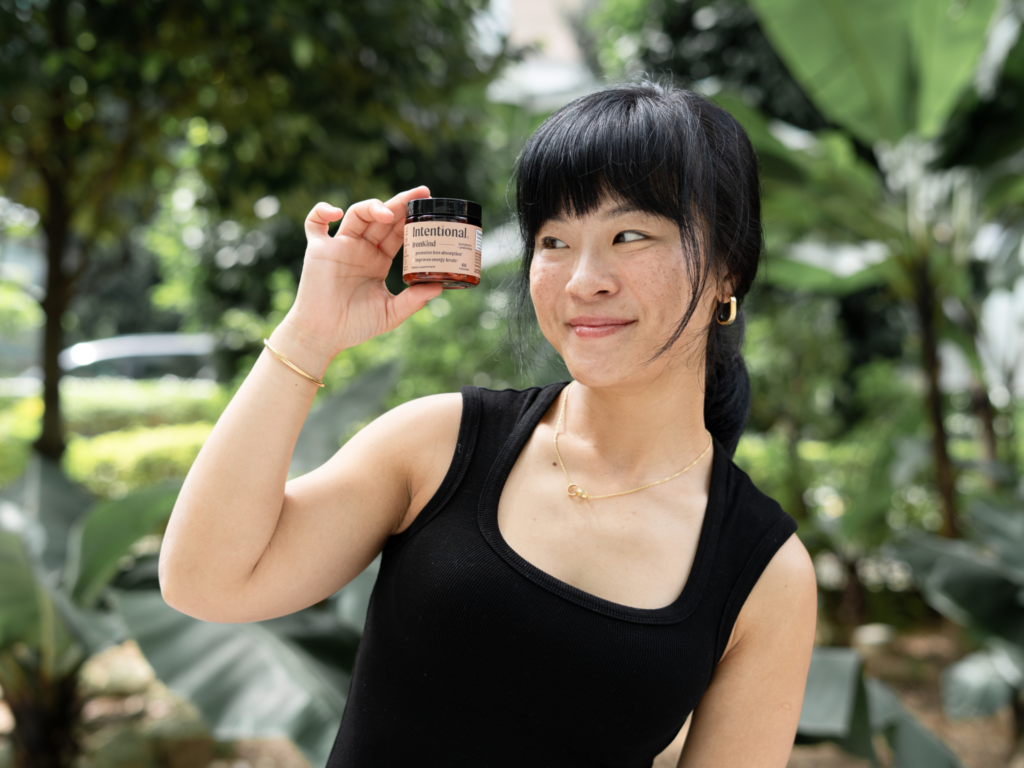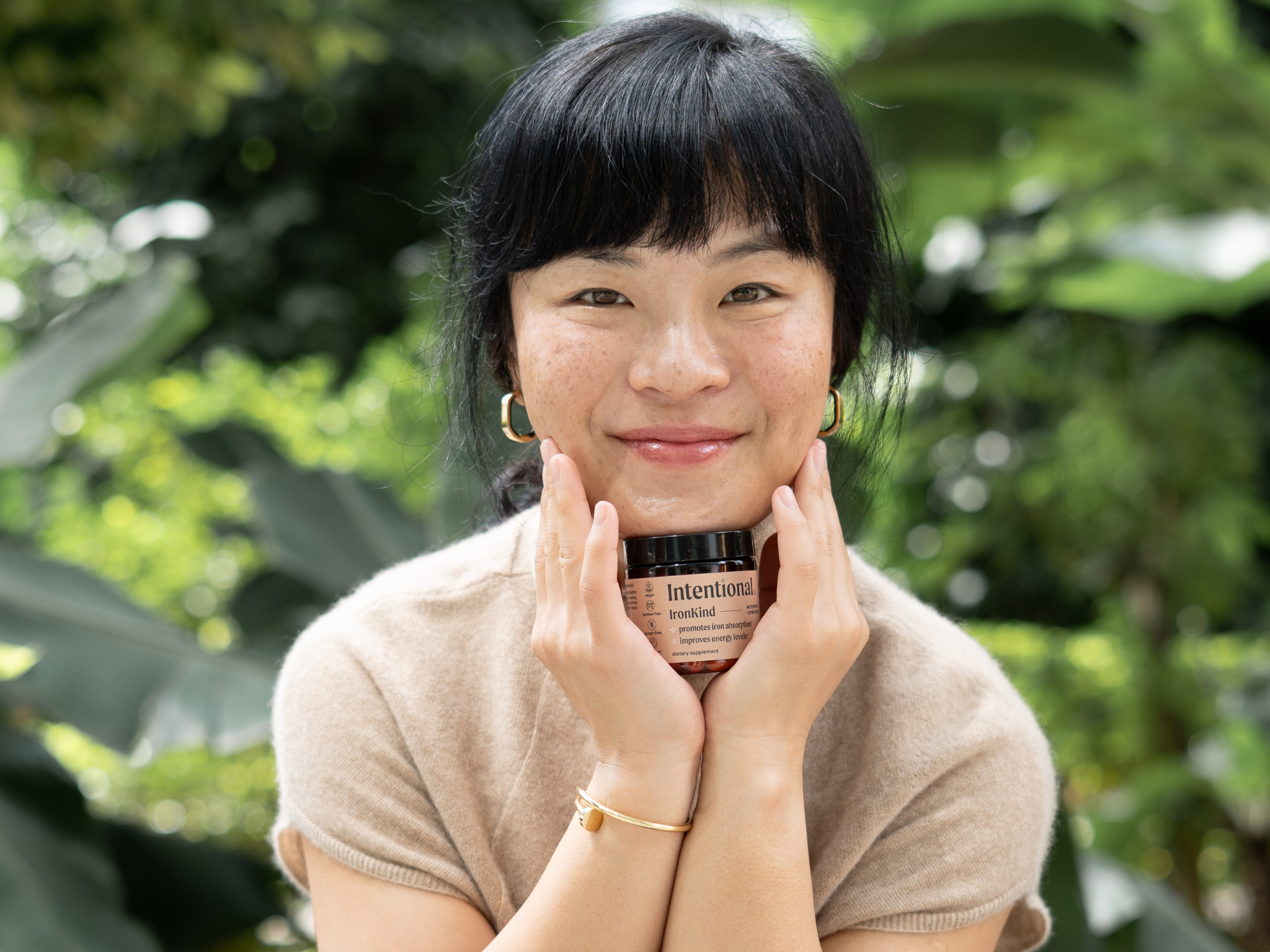Animal-Free Dairy Startup Debuts Lactoferrin Supplement to Boost Iron Regulation
6 Mins Read
Singaporean food tech startup TurtleTree has unveiled a new consumer-facing brand for supplements made from its animal-free lactoferrin protein in the US.
Precision fermentation firm TurtleTree has introduced Intentional, a consumer brand of supplements powered by its recombinant lactoferrin protein.
The brand’s first product, IronKind, combines lactoferrin with prebiotics to support iron regulation, improve energy levels, and enhance gut health. It was born out of founder and CEO Fengru Lin’s personal struggles with traditional iron supplements, which caused her body to overload, leading to side effects like bloating and constipation.
“Conventional iron supplements provide more iron, whether or not our bodies need it,” Lin tells Green Queen. “But iron supplements can also cause GI problems like nausea and constipation. Lactoferrin helps to balance our iron levels whether they are below or above regular levels.”
What is lactoferrin, and how is it produced?

Lactoferrin is an iron-binding whey protein found in human milk and bovine colostrum just after birth, and is revered for its antiviral, antibacterial, anti-carcinogenic, immunity-boosting, and gut-strengthening properties.
These functional benefits make it a highly prized ingredient, but it suffers from a supply crisis. It takes 10,000 litres of milk to produce just 1kg of purified lactoferrin, driving up prices (it retails for $750-1,500 per kg) – this is why 60% of its supply is reserved for infant formula.
To tackle that problem and make lactoferrin available in verticals like sports nutrition, women’s health, adult and elderly nutrition, and other applications, TurtleTree uses precision fermentation to produce the protein. It is a process that blends traditional fermentation with the latest advances in biotechnology to efficiently produce a compound of interest (animal-free, bioidentical lactoferrin, in this case).
There are several companies working to produce lactoferrin this way – including Australia’s All G Foods. Helaina, De Novo Foodlabs, and Daisy Lab – but TurtleTree was one of the earliest adopters in the space.
It was also the first to self-affirm the ingredient as safe in the US, and has since notified the Food and Drug Administration (FDA) of its GRAS (Generally Recognized as Safe) determination. This is key, since the self-affirmation path is in jeopardy now – thanks to health secretary Robert F Kennedy Jr – and companies may need to wait for a ‘no questions’ letter from the FDA before they can start selling novel ingredients.
Swedish startup Ironic Biotech is also using precision fermentation to develop plant-derived heme, a readily absorbed form of iron.
Could lactoferrin aid iron absorption in women?

A lack of iron is the main cause of anaemia, a condition affecting two billion people globally, with cases increasing rapidly for women, expectant mothers, young girls, and children under five. Globally, 31% of women suffered from the condition as of 2021, versus 17.5% of men, a difference that becomes more pronounced during the reproductive ages.
Menstruation causes a periodic loss of blood, which means iron stocks need to be replenished regularly. Gynaecological disorders and maternal haemorrhage are also key contributors to anaemia incidence among women of reproductive age. This is why many women are advised to take iron supplements, or, in severe cases, iron infusion therapy (though its high costs make it inaccessible to many).
While humans get iron from food and supplements, each comes with its own problems. Red meat is the most typical source of iron, but it’s also the most polluting food on the planet, and is linked with a multitude of health risks.
Meanwhile, supplements are linked to various side effects, such as nausea, dizziness, stomach ache, constipation and other digestive problems, as well as organ damage. This is because over 90% of the iron in supplements goes through our digestive tracts without being absorbed.
“The regular modern diet typically provides enough iron, but oftentimes our bodies are just not absorbing the iron that’s needed,” says Lin. That is where Intentional’s supplement comes in. “Lactoferrin helps with iron absorption and homeostasis. You can think of lactoferrin as an iron regulator.”
She notes that while IronKind can optimise iron absorption for women who can’t absorb it well, those who don’t have enough iron in their diets in the first place would need to supplement the nutrient itself.
Intentional describes its audience as those who prioritise “proactive wellness and informed self-care” and choose “nutraceuticals over traditional pharmaceuticals”. This includes women who menstruate, pregnant individuals, children, vegans, and vegetarians, all of whom are more susceptible to iron deficiency.
Working in tandem with prebiotics

IronKind works by marrying animal-free lactoferrin with prebiotics, specifically a yeast-derived polysaccharide. “While lactoferrin helps sequester iron from bad bacteria, which need iron to flourish, the prebiotics help to flourish the beneficial bacteria. Thus, these two ingredients work together to balance the gut microflora,” explains Lin.
Once iron is bound, lactoferrin delivers the nutrient to our bloodstream, where it makes haemoglobin, a protein that helps carry oxygen throughout the body. This oxygenation and blood flow improves energy levels and overall health.
“Lactoferrin is a big component of colostrum, with which it has a large overlap of benefits. If consumers are looking for an animal-free version of colostrum (and don’t want to take first milk from baby cows), IronKind is a great alternative, and prices are lower than most colostrum products,” Lin adds.
The supplement is available on Intentional’s website, with a single pack of 60 capsules setting you back $37. Intentional is in talks with retailers and pharmacies to carry the product too.
“Through a network of qualified partners, we are adopting a just-in-time manufacturing strategy to reduce the logistics around inventory load,” Lin says when asked about production volumes.
Intentional opens up new revenue stream for TurtleTree

The launch of Intentional comes after several months of uncertainty at TurtleTree. As reported by Green Queen in January, the firm had conducted multiple rounds of layoffs in the space of six months, leaving behind a skeleton staff of just nine employees at the time.
The company, which has attracted around $40M from investors since 2019, was reportedly looking to raise another $15M in a pre-Series B round later this year. But venture capital has been drying up for food tech and alternative proteins, with Lin noting that companies were undergoing “a more complex landscape” now.
“As a startup, fundraising efforts are ongoing,” she says now. “However, with the profits from Intentional, we will be able to keep the company going perpetually. Additional equity funding will go into further technology development for optimised costs, as well as pipeline products.”
TurtleTree has announced product launches with Cadence Performance Coffee and Strive Nutrition in the US, and Mad Foods in Singapore – but these are yet to roll out. Lin had previously confirmed that the collaborations were going ahead, and now reiterates that they “are ongoing launches”, promising more updates in the coming months.
She says the importance of women leading in the femtech space is “less about gender for the sake of gender, and more about awareness”.
“The truth is, women are not just smaller versions of men – our biology, hormones, and health needs are fundamentally different. But for decades, science and medicine have defaulted to a male baseline, overlooking key differences that deeply affect women’s health,” she explains.
“That’s why having women lead in femtech – especially in spaces like micronutrient wellness – is so important. We’re often the ones who’ve felt the gaps firsthand,” she adds, outlining the iron deficiency gap between women and men. “It’s a systemic blind spot. At Intentional, we’re here to change that, starting with solutions built from a place of deeper understanding and care.”



